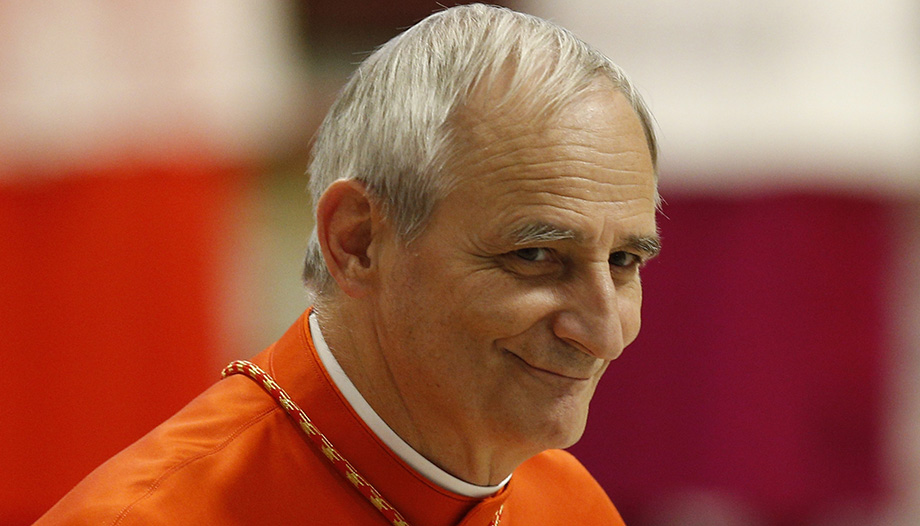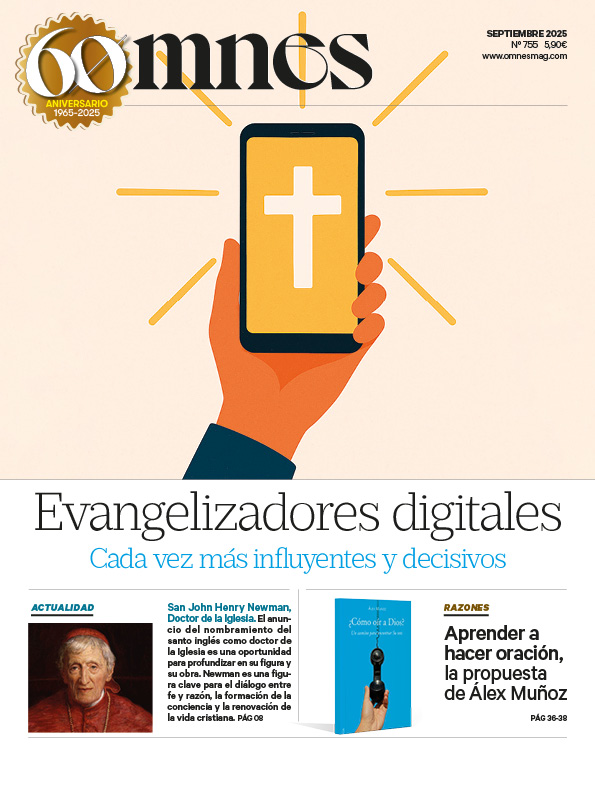The Cardinal Matteo Zuppi will not only be the Pope's envoy to Kiev, but also to Moscow, for a mission that "does not have mediation as its immediate objective," but rather that of "easing tensions," in the words of Cardinal Pietro Parolin, Vatican Secretary of State.
But why has Pope Francis chosen Cardinal Zuppi for such a delicate mission? What does the Pope hope to achieve?
Seeking a dialogue with the aggressor
Since the beginning of the large-scale Russian aggression in UkrainePope Francis has sought a direct edge with Russia. On February 25, 2022, in a totally unconventional manner, he even went to the Russian Federation's embassy to the Holy See, seeking in several interviews what he would later call a "window" of dialogue with Russian President Vladimir Putin. In vain.
Then came the videoconference with the Patriarch of Moscow, Kirillon March 16, 2022. It should have led to a historic second meeting between the Pope and the Patriarch, and to be fair, it was already underway. In reality, that videoconference further strained relations, not so much because of what happened during the conversation, but because of how Pope Francis described it afterwards, stressing that he had told Kirill that "we are not state clerics."
With Ukraine, Pope Francis has different connections. The major archbishop of the Ukrainian Greek Catholic Church, Sviatoslav ShevchukHe has known the Pope since he was eparch of Buenos Aires, and the Pope has repeatedly shown benevolence towards him. And the Pope's gestures of closeness to Ukraine have not been few.
As, for example, when in 2016 he launched the Extraordinary Collection for Ukraine. Or as when, in 2019, he convened an interdicasterial meeting with synods and bishops of the Ukrainian Greek Catholic Church precisely to discuss the Ukrainian crisis.
But Pope Francis has never left aside the link with Russia, to which he has always paid special attention. Putin is the current head of state who has been received by the Pope the most times (three), while in absolute terms he is second in number of meetings only to former German Chancellor Angela Merkel, who had met Francis five times.
Contacts with Moscow have always been considered important. The meeting with Patriarch Kirill in Havana in 2016 resulted in a final document that seemed biased toward Russian positions, although it was appreciable as an effort.
Certainly, Moscow was considered an interlocutor, if not a privileged one, at least one to which close attention should be paid. And there were results. In 2017, Cardinal Pietro Parolin was the second Vatican Secretary of State to visit Moscow. In 2021, it was the archbishop Paul Richard Gallagherthe Vatican's "foreign minister" to visit the country.
These figures serve to affirm that the Pope has always been attentive to the Ukrainian situation, although in a different way from normal chancelleries and diplomacies. But the Pope has always felt a predilection for Russia, to the point that he has always made it known that he is willing to go to Moscow as soon as he is invited. In fact, although he has been invited several times to go to Ukraine to see the situation with his own eyes, the Pope has always linked a possible trip to Kiev to a trip to Moscow.
The Pope's personal diplomacy
Thus, Pope Francis seems to think that the future of the region lies more in a dialogue with Moscow than with Ukraine. However, papal diplomacy has not failed to express its support, and even Archbishop Gallagher visited Ukraine in May 2022. From the beginning, the Pope's diplomacy pointed out the danger of military escalation, but never denied Ukraine's right to defense.
For his part, the Pope has repeatedly sent Cardinal Konrad Krajewski, prefect of the Dicastery of Charity, to bring aid to Ukraine, and has also sent Cardinal Michael CzernyThe meeting was attended by the Prefect of the Dicastery for the Service of Integral Human Development, Prefect of the Dicastery for the Service of Integral Human Development, to evaluate the situation of refugees.
Now, the Pope seems to have decided that another personal envoy is needed, and the choice has fallen on Cardinal Matteo Zuppi.
Why? Because Cardinal Zuppi, as a member of the Sant'Egidio community, was among the negotiators of the successful peace agreement in Mozambique. And then because Sant'Egidio has had a position very close to that of the Pope on the war, to the point of leading a pacifist demonstration in November 2022, and of incessantly asking for a "cease-fire", going so far as to think about the possibility of declaring Kiev an "open city", thus accepting the eventual occupation.
Zuppi represents the diplomacy of peace, but he is also an exponent of positions that the Pope seems to share. Once again, therefore, Pope Francis decides to act personally, in the hope that Cardinal Zuppi, also thanks to the contacts on the ground of Sant'Egidio's charitable organizations, can at least bring some concrete results.
At the end of the day, it is about alleviating suffering, and this is the work that Christian organizations have been doing since the beginning in Ukraine. In fact, it has always been, if we think that the All-Ukrainian Council of Churches is more than 25 years old, and has been one of the organizations closest to the victims of the conflict that has been going on for years in the border areas, in the self-proclaimed republics of Dombas and Luhansk.
In fact, neither Russia nor Ukraine wants peace mediation missions, and they have made this clear in various ways. But a mission that could at least lead to a cease-fire has received praise last week from a Russian Foreign Ministry spokesman, indicating an openness on Russia's part in this regard. Is this a statement of form, a signal of Russian need to stop to rearm and regroup, or a sincere desire for peace?
A possible peace
It is difficult to define, because what is noticeable in this war is that it is a hybrid war, fought not only on the ground, but also with the dissemination of information, in a great game between the parties.
The Holy See knows this, and Parolin also spoke of hybrid warfare in the interdicasterial with the Ukrainian Greek Catholic Church in 2019. For the moment, however, what Cardinal Parolin called "creative solutions" are needed first and foremost. And one of these solutions would be a great Peace Conference in Europe, to rediscover what is called the "spirit of Helsinki".
What does it consist of? The spirit that led, in 1975, to the Declaration of Helsinki, which gave rise to the Organization for Security and Cooperation in Europe. The declaration also established, at the proposal of the Holy See, the principle of the defense of religious freedom in all States adhering to the initiative, and this included the Soviet Union, which had promoted the conference and had wanted the Holy See to be present.
It was this passage that marked the first crackle of the atheist regimes, now obliged not to pursue religion, on pain of compromising a dialogue that had been conducted with difficulty. It is no coincidence that, in the ten years following Helsinki, the Soviet world began to creak, while Mikhail Gorbachev's perestroika policy created the conditions for the fall of the Berlin Wall.
However, times are very different, and the "spirit of Helsinki" could hardly return in the form of fifty years ago, because history and the situation are different. But the Holy See wants to propose a new multilateral world, as opposed to the polarized one that is in fact dividing even the reactions to the war in Ukraine into blocs.
Peace mediation
Ideally, therefore, the Holy See would be called upon to mediate. But even this seems difficult. When the Pope revealed Cardinal Zuppi's mission, without going into details, it was April 30, and the Pope was on the flight back from his trip to Hungary. But the Pope's words were interpreted as those of a possible mediation, and he immediately hastened to deny it. A sign, after all, that peace is especially difficult to achieve, and that in Ukraine it is unlikely to be reached unless the two sides reach a compromise.
The Pope is trying to reach the compromise with a special envoy. It is not certain that this will be enough.
Last week, Pope Francis appointed Cardinal Matteo Zuppi, president of the Italian Bishops' Conference, as special envoy for Ukraine and Russia.
The news came a day after statements by Archbishop Claudio Gugerotti, prefect of the Dicastery for the Oriental Churches and former nuncio to Ukraine, who stressed that he knew nothing about his possible role as envoy to Moscow. But this role will be Zuppi's, Cardinal Parolin said at a round table for peace in Bologna. Zuppi," the Vatican Secretary of State said, "will be a delegate of the Pope not only in Kiev, but also in Moscow. So we must make our support felt for the person who has received such a delicate mission."
Further detailing the mission of the CEI president, Cardinal Parolin said - speaking on the sidelines of the presentation of the book edited by Msgr. Dario Edoardo Viganò "Popes and the Media. Edition and reception of the documents of Pius XI and Pius XII in cinema, radio and television". - that the mission does not have "mediation as an immediate objective", but rather that of "easing tensions in the Ukrainian conflict", trying to "foster an environment that can lead to paths of peace".
News about sending a representative of the Pope had been going on since Pope Francis announced a confidential mission for peace in Ukraine, a mission denied by both the Russian and Ukrainian sides, but reiterated several times by Cardinal Parolin himself, the Vatican Secretary of State.
Mission to be defined
The modalities of the mission have not yet been defined. Vaticanist Sandro Magister points out that Cardinal Zuppi is a member of the Community of Sant'Egidio, and that Andrea Riccardi, founder of Sant'Egidio, has had positions not exactly favorable to Ukraine in relation to the war, first taking sides for Kiev to be declared an "open city" (he made the same appeal for Aleppo), and then organizing a pacifist procession on November 5 in which he called for a cease-fire.
Magister also points out that the position of an immediate ceasefire is far removed from that of Archbishop Paul Richard Gallagher, Vatican Secretary for Relations with States, who has been to Ukraine and who has repeatedly supported the need for an armed (but proportionate) defense, even with all the diplomatic prudence of the Holy See, which has repeatedly called for creative solutions and immediately warned against escalation.
For this reason, the Pope would have preferred Sant'Egidio's parallel diplomacy, which led, among other things, to the peace agreement in Mozambique, which Zuppi brokered, but which has proved problematic in other regions of the world.
Cardinal Zuppi's mission received, however, a kind of endorsement from the Kremlin. In fact, a spokesman for Russian Foreign Minister Sergei Lavrov, in statements to the state agency Ria Novosti, made it known that Moscow "positively values the Vatican's peace initiative," although so far the Holy See "has not taken any initiative for the trip of an emissary to Russia."
The Foreign Ministry stressed that it took note of the Holy See's "sincere desire to promote the peace process," adding that "any efforts in this direction will only make sense if they take into account Russia's well-known principled position on possible peace negotiations."
The Foreign Ministry was also keen to point out that so far Kiev "continues to categorically reject the possibility of negotiations with Moscow and is betting on war."







